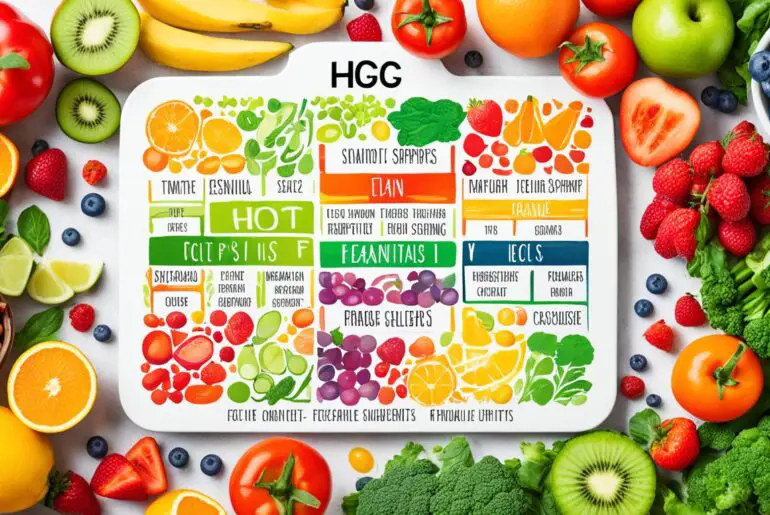Did you know that the HCG diet, which involves the use of HCG diet drops along with severe calorie restriction, is not proven to be safe or effective for weight loss? In fact, the Food and Drug Administration (FDA) advises against the use of over-the-counter HCG weight-loss products, as they are considered illegal and not approved for this purpose. HCG, a hormone primarily used as a prescription medication for fertility issues, is not meant for weight loss.
Severe calorie restriction, as recommended by the HCG diet, can lead to a range of risks and side effects. These include gallstone formation, irregular heartbeat, limited intake of essential vitamins and minerals, electrolyte imbalance, fatigue, irritability, depression, fluid buildup, swelling of the breasts in males, and even the risk of blood clots. It is crucial to explore safer and more sustainable methods for weight loss under the guidance of a healthcare provider.
Key Takeaways:
- The HCG diet, which combines HCG diet drops with severe calorie restriction, is not proven to be safe or effective for weight loss.
- The FDA advises against the use of over-the-counter HCG weight-loss products, as they are illegal and not approved for this purpose.
- Severe calorie restriction can lead to various risks and side effects, including gallstone formation, irregular heartbeat, limited nutrient intake, and the risk of blood clots.
- Consulting a healthcare provider is important to explore safer and more sustainable methods for weight loss, such as a balanced diet and regular exercise.
- Prioritizing long-term health and well-being is essential when pursuing weight loss goals.
Understanding the HCG Diet and Its Claims
The HCG diet is a weight-loss approach that combines the use of HCG hormone supplements or injections with severe calorie restriction. The diet claims to promote weight loss by stimulating the burning of stored body fat while preserving muscle mass. However, there is no scientific evidence to support these claims, and the FDA does not approve the use of HCG for weight loss. The diet gained popularity in the 1950s and is based on the theories of a British physician named Albert Simeons. Simeons claimed that HCG could reduce hunger and redistribute body fat. However, these claims have not been substantiated by scientific research.
Despite the alleged benefits, the effectiveness of the HCG diet remains questionable. Without scientific evidence to support its claims, individuals should approach this diet with caution and consider alternative weight loss methods that have been proven to be safe and effective. A balanced diet and regular exercise continue to be the most reliable ways to achieve sustainable weight loss.
“The HCG diet claims to promote weight loss by stimulating the burning of stored body fat while preserving muscle mass. However, there is no scientific evidence to support these claims.”
Before embarking on any weight loss program, it is recommended to consult with a healthcare professional who can provide personalized guidance and advice. They can help develop a comprehensive and sustainable weight loss plan tailored to individual needs and goals. Remember, prioritizing overall health and well-being should always be the primary focus when pursuing weight loss.
FDA Warnings and Legal Issues

The use of HCG diet products for weight loss has received warnings and strict regulations from the Food and Drug Administration (FDA). Over-the-counter HCG weight-loss products are considered illegal and are not approved by the FDA. Despite claims of being “homeopathic,” the FDA states that these products are still not safe for use. The sale of over-the-counter HCG weight-loss products is a violation of the law.
It’s important to note that the use of HCG for weight loss is only legal when prescribed by a doctor for specific medical purposes, such as fertility treatment. Using HCG for weight loss without medical supervision is not recommended and may pose serious health risks.
Key Points:
- Over-the-counter HCG weight-loss products are illegal and not approved by the FDA.
- The sale of these products is a violation of the law.
- HCG for weight loss is only legal when prescribed by a doctor for specific medical purposes.
- Using HCG for weight loss without medical supervision may pose serious health risks.
Comparing HCG Diet Legality and FDA Warnings
| Issue | Legality and FDA Warnings |
|---|---|
| Over-the-counter HCG weight-loss products | Illegal and not approved by the FDA |
| Sale of HCG weight-loss products | Violation of the law |
| HCG for weight loss | Legal only when prescribed by a doctor for specific medical purposes |
| Using HCG for weight loss without medical supervision | May pose serious health risks |
It is crucial to adhere to FDA regulations and prioritize the guidance of a healthcare professional when considering weight loss methods. Successful weight loss can be achieved through safer alternatives that promote long-term health and well-being.
Potential Side Effects of HCG Diet Drops
When considering the use of HCG diet drops, it is important to be aware of the potential side effects and health risks associated with this weight loss approach. These side effects may include:
- Fatigue: Some individuals may experience feelings of exhaustion and lack of energy while on the HCG diet.
- Irritability: The severe calorie restriction of the HCG diet can lead to irritability and mood swings.
- Restlessness: The low-calorie intake combined with HCG diet drops may cause feelings of restlessness and difficulty sleeping.
- Depression: The restrictive nature of the HCG diet can contribute to feelings of sadness or depression in some individuals.
- Fluid buildup (edema): The HCG diet may lead to an accumulation of fluid in the body, resulting in swelling in the extremities.
- Swelling of the breasts in boys and men (gynecomastia): HCG diet drops have been associated with the development of breast tissue in males, leading to breast enlargement and tenderness.
In addition to these side effects, there is a significant concern regarding the risk of blood clots forming and blocking blood vessels (thromboembolism) as a result of HCG diet drops. This can have serious health implications and requires immediate medical attention.
Furthermore, the severe calorie restriction recommended by the HCG diet can lead to several health risks, including:
- Gallstone formation: Rapid weight loss and limited fat intake can increase the risk of gallstone formation.
- Irregular heartbeat: The extreme calorie restriction may cause irregularities in heart rhythm.
- Limited intake of essential nutrients: The low-calorie diet may result in inadequate intake of vital vitamins, minerals, and macronutrients.
- Electrolyte imbalance: The HCG diet can disrupt the balance of electrolytes in the body, leading to various health complications.
Before embarking on the HCG diet, it is crucial to consider these potential side effects and health risks. It is advisable to discuss your weight loss goals with a healthcare professional who can guide you towards safer and more sustainable approaches.
Lack of Scientific Evidence for the HCG Diet

Scientific evidence of the HCG diet’s effectiveness for weight loss is notably lacking. Studies and research examining the HCG diet have failed to provide conclusive evidence supporting its claims. According to a commentary published in the International Journal of Obesity, no scientific research has shown that the HCG hormone has any significant effects on weight loss.
In a 2016 article published in the Journal of Dietary Supplements, researchers concluded that the HCG diet is not effective in supporting weight loss and may potentially do more harm than good. The lack of scientific evidence raises concerns about the safety and efficacy of this diet.
When looking for a weight loss method, it is crucial to consider alternative approaches that are backed by scientific research. Consulting with a healthcare professional is recommended to explore safer and more evidence-based weight loss methods.
| Study | Conclusion |
|---|---|
| International Journal of Obesity commentary | No research has shown the HCG hormone to have any effects on weight loss. |
| Journal of Dietary Supplements article | The HCG diet is not effective for weight loss and may have adverse effects. |
The International Journal of Obesity commentary
“No research has shown the HCG hormone to have any effects on weight loss.”
The Journal of Dietary Supplements article
“The HCG diet is not effective for weight loss and may have adverse effects.”
Risks of Nutrient Deficiencies and Inadequate Caloric Intake
The HCG diet’s severe calorie restriction, typically around 500 to 800 calories per day, can put individuals at risk of nutrient deficiencies and inadequate caloric intake. The limited food choices allowed on the diet may lead to deficiencies in essential nutrients, such as B vitamins, fiber, and fat-soluble vitamins like vitamins A, D, E, and K. Additionally, the very low-calorie intake can result in deficiencies in macro- and micronutrients and may increase the risk of developing other health problems, such as cancer, diabetes, and heart disease. It is important to consider the potential risks of nutrient deficiencies when following the HCG diet.
Severe calorie restriction on the HCG diet can lead to nutrient deficiencies and imbalances. The limited food choices and low-calorie intake may result in inadequate intake of essential vitamins, minerals, and other nutrients, which can negatively impact overall health and well-being.
The Importance of Nutrient Balance
Proper nutrition is vital for supporting overall health and ensuring the body functions optimally. Nutrient deficiencies can lead to various health problems, ranging from fatigue and weakened immune function to more serious conditions like anemia and bone loss. Inadequate caloric intake combined with an imbalanced nutrient profile can further exacerbate the risks of nutrient deficiencies on the HCG diet.
Here’s a closer look at some key nutrients that may be at risk of deficiency on the HCG diet:
| Nutrient | Role in the Body | Food Sources |
|---|---|---|
| B Vitamins | Important for energy production, nerve function, and DNA synthesis | Whole grains, legumes, leafy greens, dairy products, eggs, meat |
| Fiber | Aids in digestion, promotes satiety, and helps maintain bowel regularity | Fruits, vegetables, whole grains, legumes, nuts, seeds |
| Fat-Soluble Vitamins | Essential for vision, bone health, immune function, and blood clotting | Dairy products, fatty fish, liver, egg yolks, fortified cereals |
| Macro- and Micronutrients | A variety of essential nutrients required for overall health and well-being | Diverse and balanced diet including fruits, vegetables, lean proteins, whole grains, and healthy fats |
It’s evident that the severe caloric restriction and limited food choices on the HCG diet can significantly impact nutrient intake. This can lead to imbalances and deficiencies, which may have long-term consequences on overall health and well-being.
Therefore, it is essential to ensure proper nutrient balance and intake when following any diet plan, including the HCG diet. Consulting with a healthcare professional or registered dietitian can provide personalized guidance and recommendations to mitigate the risks of nutrient deficiencies during the diet.
Professional Recommendations and Safer Alternatives

When it comes to weight loss, health professionals strongly advise against the use of the HCG diet and recommend considering safer alternatives. Before embarking on any weight loss program, it is crucial to consult with a doctor or healthcare provider. They can provide expert guidance and support in developing a balanced and sustainable weight loss plan tailored to your specific needs.
Here are some professional recommendations for healthy weight loss:
- 1. Focus on a Healthy Diet: Opt for a well-rounded meal plan that includes a variety of nutritious foods, such as fruits, vegetables, lean proteins, whole grains, and healthy fats. Prioritize portion control and mindful eating to maintain a healthy calorie balance.
- 2. Engage in Regular Exercise: Incorporate regular physical activity into your routine. Aim for at least 150 minutes of moderate-intensity exercise or 75 minutes of vigorous-intensity exercise per week. Find activities that you enjoy to make your fitness journey sustainable.
- 3. Seek Support: Enlist the help of a registered dietitian or nutritionist who can provide personalized guidance and support throughout your weight loss journey. They can help you create a customized meal plan and offer strategies to overcome any challenges you may encounter.
- 4. Practice Mindful Eating: Pay attention to your body’s hunger and fullness cues. Eat slowly and savor each bite, focusing on the taste, texture, and satisfaction derived from the food. Avoid distractions such as television or smartphones during meal times.
- 5. Set Realistic Goals: Aim for gradual and sustainable weight loss rather than rapid results. Setting realistic goals not only increases your chances of success but also promotes a healthier mindset and long-term weight maintenance.
“Weight loss should not be about extreme diets or quick fixes. It’s about making sustainable lifestyle changes that promote overall health and well-being.” – Dr. Sarah Johnson, Registered Dietitian
By following these professional recommendations and adopting healthier habits, you can achieve your weight loss goals while prioritizing your long-term health. Remember, weight loss is a journey, and it’s essential to choose methods that are safe, sustainable, and supported by scientific evidence.
| Weight Loss Method | Pros | Cons |
|---|---|---|
| The HCG Diet | – Claims to promote rapid weight loss – Can provide structure and guidelines for meal planning |
– Lack of scientific evidence – Risk of side effects and nutrient deficiencies – Not approved by the FDA |
| Healthy Diet and Exercise | – Promotes long-term weight loss – Improves overall health and well-being – Supported by scientific research |
– Requires consistent effort and lifestyle changes |
The Importance of Safer Alternatives
Choosing safer alternatives to the HCG diet is vital to ensure your well-being and long-term success in achieving your weight loss goals. By focusing on a healthy diet, regular exercise, and seeking professional guidance, you can make sustainable lifestyle changes that support both your physical and mental health.
Conclusion
The HCG diet, with its use of HCG diet drops and severe calorie restriction, has not been substantiated by scientific evidence to support its effectiveness and safety for weight loss. As advised by the FDA, over-the-counter HCG weight-loss products are considered illegal and may pose serious health risks. Potential side effects of the HCG diet include fatigue, irritability, restlessness, depression, fluid buildup, and the risk of blood clots. Furthermore, nutrient deficiencies and inadequate caloric intake are valid concerns with this diet.
It is crucial to explore alternative methods for weight loss that prioritize long-term health and well-being. Under the guidance of a healthcare professional, individuals should consider a balanced diet and regular exercise. Safer approaches may include portion control, mindful eating, and incorporating a variety of nutritious foods into a well-rounded meal plan. Achieving sustainable weight loss is a journey that requires a comprehensive lifestyle approach, rather than relying on quick fixes that lack scientific support.
When it comes to weight loss, there are no shortcuts or magic solutions. Prioritizing a healthy and balanced approach can lead to long-lasting results and improved overall health. While the HCG diet may promise quick weight loss, its risks and lack of scientific evidence make it an unreliable option. By focusing on sustainable methods backed by research, individuals can achieve their weight loss goals while maintaining their well-being.
FAQ
Are HCG diet drops safe to use for weight loss?
No, HCG diet drops have not been proven to be safe or effective for weight loss. The FDA advises against the use of over-the-counter HCG weight-loss products, as they are not approved for this purpose and are considered illegal.
What are the potential side effects of HCG diet drops?
The potential side effects of HCG diet drops include fatigue, irritability, restlessness, depression, fluid buildup (edema), swelling of the breasts in boys and men (gynecomastia), and the risk of blood clots.
Is the HCG diet supported by scientific evidence?
No, there is a lack of scientific evidence to support the effectiveness of the HCG diet for weight loss. Research has not shown that the HCG hormone has any effects on weight loss.
What are the risks of nutrient deficiencies and inadequate caloric intake on the HCG diet?
The severe calorie restriction on the HCG diet can put individuals at risk of nutrient deficiencies and inadequate caloric intake. This may lead to deficiencies in essential nutrients and increase the risk of developing other health problems.
What are some safer alternatives to the HCG diet for weight loss?
Safer alternatives for weight loss include developing a balanced and sustainable weight loss plan under the guidance of a healthcare professional. This may include portion control, mindful eating, and incorporating a variety of nutritious foods into a well-rounded meal plan.
What is the FDA’s stance on the HCG diet and its products?
The FDA warns against the use of over-the-counter HCG weight-loss products, as they are considered illegal and may pose serious health risks. The sale of these products is a violation of the law.
Should I consult with a healthcare provider before starting the HCG diet?
Yes, it is important to consult with a doctor or healthcare provider before starting any weight loss program. They can provide guidance on developing a safe and effective weight loss plan.
What are the professional recommendations for weight loss?
Health professionals recommend prioritizing long-term health and well-being when pursuing weight loss goals. This may involve adopting a balanced diet, engaging in regular exercise, and considering safer methods for weight loss.




